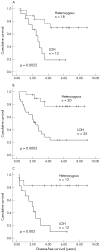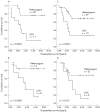Metastatic recurrence of early-stage colorectal cancer is linked to loss of heterozygosity on chromosomes 4 and 14q
- PMID: 16731603
- PMCID: PMC1860407
- DOI: 10.1136/jcp.2005.033167
Metastatic recurrence of early-stage colorectal cancer is linked to loss of heterozygosity on chromosomes 4 and 14q
Abstract
Objective: To investigate the prognostic value for loss of heterozygosity (LOH) of chromosomes 4 and 14q in early-stage colorectal cancer (CRC).
Methods: A total of 70, largely microsatellite stable, tumours and their corresponding normal mucosa were subjected to microdissection and analysed for LOH at chromosomes 4 and 14q by using 13 highly polymorphic microsatellite markers. LOH was correlated with the survival of the patients, using univariate, multivariate and Kaplan-Meier's survival curves.
Result: LOH at D4S2935, D4S1579 and D4S1595 on chromosome 4 was significantly associated with metastatic recurrence of early-stage CRC. For chromosome arm 14q, two minimal regions of deletion were associated with metastatic recurrence and mapped to neighbouring markers D14S275/D14S49 at 14q12-13 and D14S65/D14S250 at 14q32. High-level loss (loss of five to eight of the informative microsatellite markers) on both chromosomes 4 and 14q, to be an independent prognostic indicator in early-stage CRC was shown by multivariate analysis.
Conclusion: Determining the LOH of chromosomes 4 and 14q and their extent in primary tumours of patients with early-stage CRC may constitute a molecular signature of metastatic recurrence. This may be achieved if new finding sheds light on the treatment of this subgroup of patients that have been largely ignored.
Conflict of interest statement
Competing interests: None.
References
-
- Kahlenberg M S, Sullivan J M, Witmer D D.et al Molecular prognostics in colorectal cancer. Surg Oncol 200312173–186. - PubMed
-
- Compton C C. Colorectal carcinoma: diagnostic, prognostic, and molecular features. Mod Pathol 200316376–388. - PubMed
-
- Ovaska J, Jarvinen H, Kujari H.et al Follow‐up of patients operated on for colorectal carcinoma. Am J Surg 1990159593–596. - PubMed
-
- Olson R M, Perencevich N P, Malcolm A W.et al Patterns of recurrence following curative resection of adenocarcinoma of the colon and rectum. Cancer 1980452969–2974. - PubMed
Publication types
MeSH terms
Substances
LinkOut - more resources
Full Text Sources
Other Literature Sources
Medical




